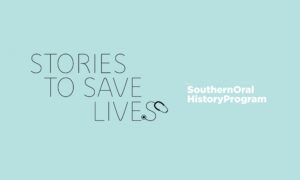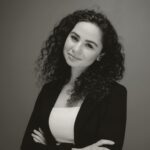Discovering My Passion for the Health Humanities
When reflecting on my freshman year at the University of North Carolina–Chapel Hill, ENGL 71H was easily my academic highlight. Entitled “Healers and Patients,” Dr. Kym Weed’s first year seminar takes a deep dive into the relationships individuals form with their doctors and the overarching systems governing such interactions. Throughout the semester, we read numerous essays, articles, and memoirs that covered topics such as grappling with illness, clinical empathy (or a lack thereof), and various flaws in the American medical system.
 Dr. Weed’s reading selections for ENGL 71H were incredibly intriguing– perhaps, the most enlightening texts I have read in a college course to date. The first book we read was Ask Me About My Uterus, a devastating depiction of author Abby Norman’s tumultuous experiences with endometriosis. In this text, Norman reflects upon absurd obstacles she faced while awaiting a diagnosis and treatment, many of which highlighted critical issues regarding the negative stigmatization of women’s reproductive health and the frequent dismissal of women’s chronic pain. While reading a chapter one night before class, I distinctly remember sending an excerpt to my mother and sharing a sardonic laugh about how applicable Norman’s words were to our own personal experiences. Similarly, in the months since finishing the book, friends have confided in me about doctors who have grossly mistreated them or downplayed their ailments. Knowing you are not alone in your ordeals is a powerful thing, and Norman’s book provides this comfort. Additionally, I believe that her book made me a better advocate for my own health moving forward.
Dr. Weed’s reading selections for ENGL 71H were incredibly intriguing– perhaps, the most enlightening texts I have read in a college course to date. The first book we read was Ask Me About My Uterus, a devastating depiction of author Abby Norman’s tumultuous experiences with endometriosis. In this text, Norman reflects upon absurd obstacles she faced while awaiting a diagnosis and treatment, many of which highlighted critical issues regarding the negative stigmatization of women’s reproductive health and the frequent dismissal of women’s chronic pain. While reading a chapter one night before class, I distinctly remember sending an excerpt to my mother and sharing a sardonic laugh about how applicable Norman’s words were to our own personal experiences. Similarly, in the months since finishing the book, friends have confided in me about doctors who have grossly mistreated them or downplayed their ailments. Knowing you are not alone in your ordeals is a powerful thing, and Norman’s book provides this comfort. Additionally, I believe that her book made me a better advocate for my own health moving forward.
Our second unit, focused on systemic racism and inequities in American healthcare, included a close reading of Damon Tweedy’s Black Man in aWhite Coat. I appreciated Tweedy’s ability to reflect on both the mistreatment BIPOC patients face and the injustices he faced as a black physician interacting with medical school professors, superiors, and patients alike. The class’s small group setting facilitated engrossing discussions about how to approach racial differences in a clinical setting effectively. As an aspiring physician myself, the experience certainly broadened my perspective and compelled me to think more critically about issues I had long been aware of but never explored thoroughly.
I feel the class also expanded my personal and analytical understandings of the traditional narrative, which was another aspect I truly adored. Mom’s Cancer, Brian Fies’s autobiographical account of his mother’s illness journey, introduced me to the genre of graphic medicine. The visual medium heightens both the comedic and tragic elements of the story: one moment I was chuckling over a comic book-like superhero sequence, and the next I was in tears over the immense pain visible in his suffering mother’s eyes.
 Throughout the semester, we worked in groups to analyze oral histories as part of the Southern Oral History Project’s Stories to Save Lives project. We listened to numerous interviews in which a diverse group of North Carolina residents shared their personal healthcare experiences. As a STEM student accustomed to researching quantitative data and statistics, I was surprised to learn of the health humanities’ far more intimate research styles. Exposure to these qualitative interviewing methods opened my eyes to the lush world of humanities research. I learned the value of centering the human experience in public health studies and developed an interest in conducting my own oral history interviews in the future
Throughout the semester, we worked in groups to analyze oral histories as part of the Southern Oral History Project’s Stories to Save Lives project. We listened to numerous interviews in which a diverse group of North Carolina residents shared their personal healthcare experiences. As a STEM student accustomed to researching quantitative data and statistics, I was surprised to learn of the health humanities’ far more intimate research styles. Exposure to these qualitative interviewing methods opened my eyes to the lush world of humanities research. I learned the value of centering the human experience in public health studies and developed an interest in conducting my own oral history interviews in the future
If you have any interest in pursuing a healthcare profession, this class is a must-take. When applying to college, I would hear stories of students taking random classes that just so happened to evolve into lifelong passions. I was always somewhat doubtful that the same would happen for me; however, I can genuinely say that I have never fallen in love with an academic subject as wholeheartedly as I have the health humanities. After finishing this course, I developed a hunger for more knowledge in this discipline. I added an English Major with a concentration in Science, Medicine, and Literature and cannot wait to continue fostering my health humanities passion during my time at Carolina.
Baylee Materia is a sophomore studying neuroscience and pre-med. When she made the decision to enter college as a STEM major, she assumed that she would have to toss her love of humanities aside. Discovering the HHIVE lab taught her not only that she can merge these seemingly contrasting passions of hers, but that an interdisciplinary approach is essential in a pre-medical curriculum. The job of a physician goes beyond the concrete science and technical intellect; one must be emotionally intelligent and able to understand the complex socioeconomic and cultural determinants of health. With a background in the health humanities, Baylee hopes to become a member of a new generation of healthcare professionals that approaches their work with a more nuanced and compassionate perspective.


